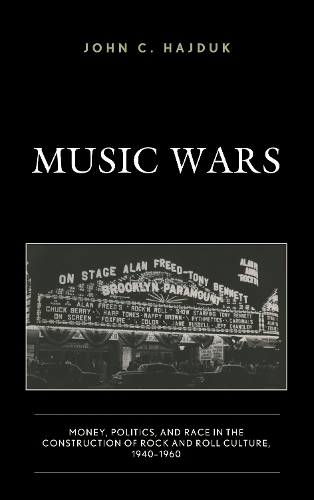
Music Wars: Money, Politics, and Race in the Construction of Rock and Roll Culture, 19401960
(Hardback)
Available Formats
Publishing Details
Music Wars: Money, Politics, and Race in the Construction of Rock and Roll Culture, 19401960
By (Author) John C. Hajduk
Bloomsbury Publishing PLC
Lexington Books
15th October 2018
United States
Classifications
Professional and Scholarly
Non Fiction
Music reviews and criticism
306.484240973
Physical Properties
Hardback
216
Width 159mm, Height 231mm, Spine 21mm
540g
Description
In the mid-twentieth century, certain elements of the American popular music industry (publishers, recording companies, and broadcasters) began to redefine their product as something more than mere entertainment. This became evident in the arguments made by competing sides in a series of clashes that unfolded during that period, starting with the ASCAP-Radio dispute of 1941 and ending with the payola scandal in 1959. Although these disputes typically revolved around economic issues, in making their cases to the public the respective sides often asserted the significant role played by popular music in promoting core national values. While such rhetoric was basically self-serving, when set against the backdrop of major events like World War II, the Civil Rights Movement, and the Cold War, it resonated strongly with the public and helped convince many that popular music offered more to its audience than momentary diversion. Considering that the resolutions to these conflicts also tended to expand opportunities for previously marginalized styles and performers, notably African-Americans and rural southerners, it became natural to link popular music to ideas of social progress as well. This contributed to the creation of what could be called rock and roll culture, a coherent set of values related to concepts of youth, authenticity, sexual liberation, and social equality that emerged by the end of the 1950s. These traits became a prevalent part of American culture through the end of the twentieth century, with popular music seen a perhaps the most significant medium for expressing those values.
Reviews
Utilizing an abundance of primary sources and writing in a style that is highly accessible, John C. Hajduk provides an intriguing approach to evaluating rock and roll. He centers on the commercial, political, and social establishment that reacted to musical and cultural forces from below that threatened the post-World War II status quo. His up-to-date focus on the gatekeepers rather than the gate crashers adds a fascinating lens from which to understand how the values of regional, racial, ethnic, and working-class outsiders eventually helped transform contemporary mainstream culture. -- Michael T. Bertrand
In Music Wars, John C. Hajduk revisits some of the best-known political and legal conflicts over American popular music in the 1940s and 50s, from the ASCAP broadcast ban before World War II to the Congressional payola hearings in the 1950s. With special attention to the intersection of fans, artists, and the industrys economic and cultural gatekeepers, he cogently analyzes how the American popular music industry came to terms with diverse audiences with diverse tastes and made room, albeit often reluctantly, for previously marginalized musical voices. -- David Suisman, University of Delaware
Music Warsis an affecting account of a fascinating periodone with which most of us can identify. We live in a culture imbued not just with rock and roll, but with the history of rock and roll, and John Hajduks new book gives us a window into that reality. -- Aaron Weinacht, University of Montana Western, professor of history * New Books Network *
Author Bio
John C. Hajduk is professor of history at the University of Montana Western.
